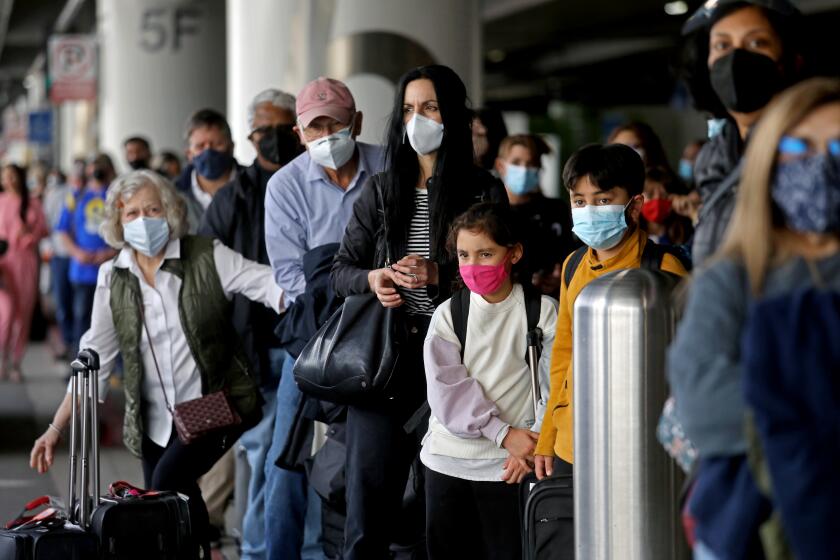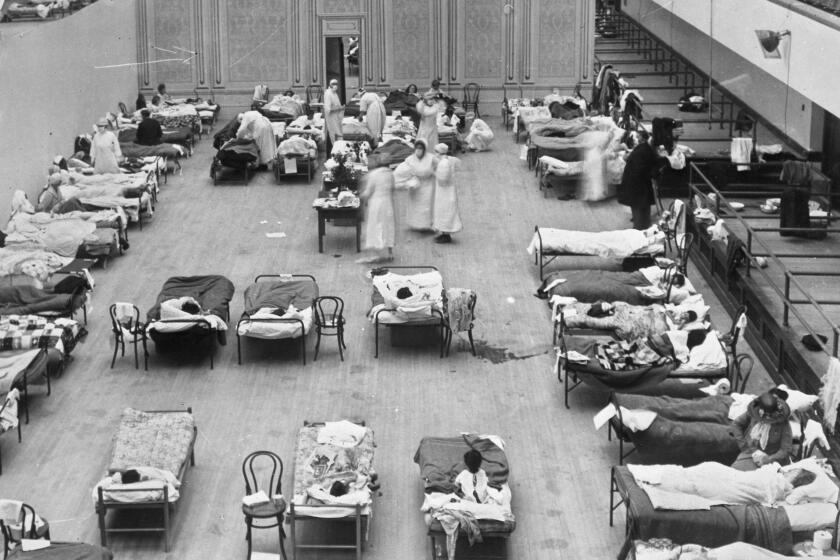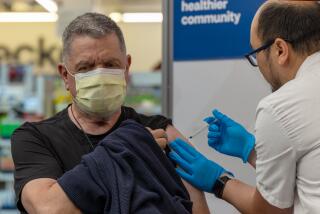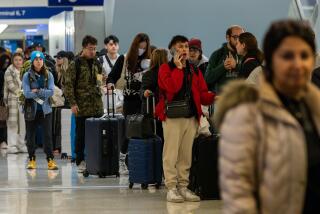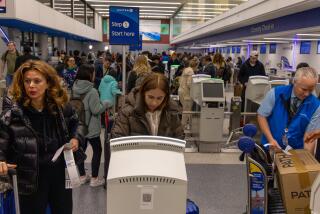With Omicron surging in California, here are some tips for a safe Christmas gathering
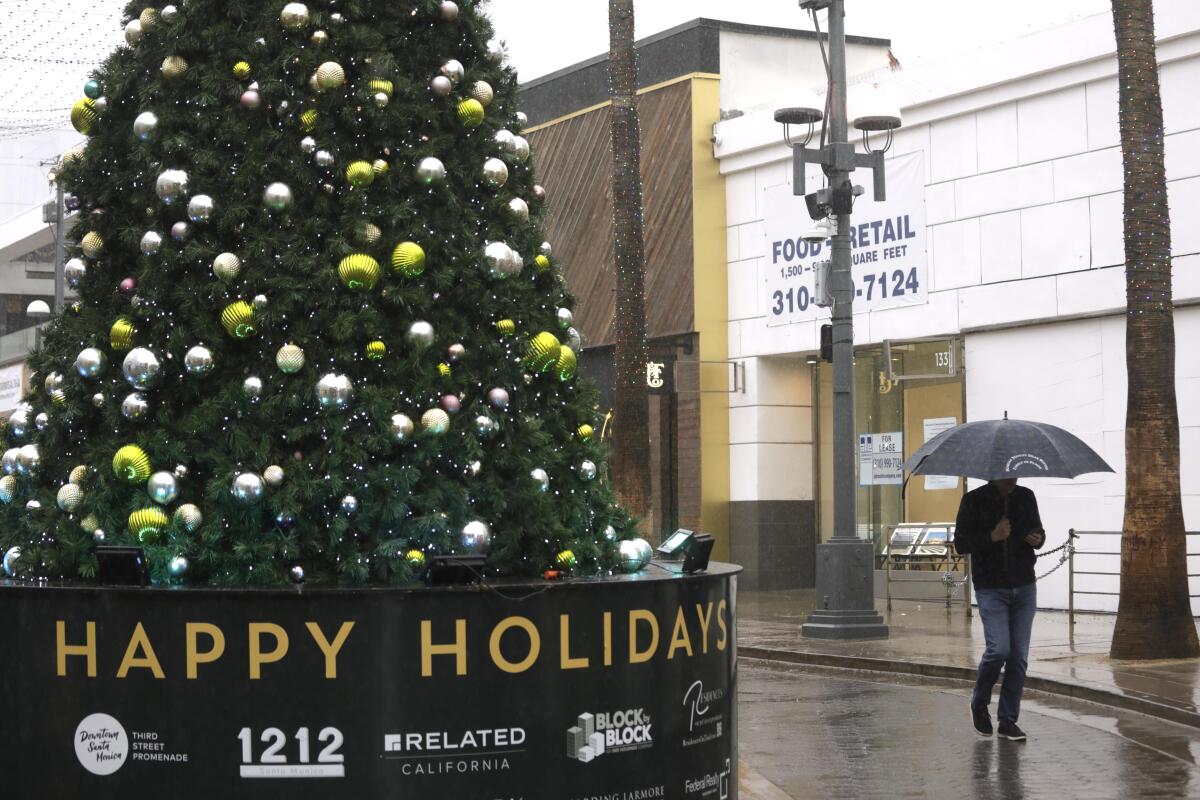
- Share via
Officials are urging people to enjoy Christmas gatherings while keeping coronavirus safety in mind.
That means keeping gatherings small, making sure guests are vaccinated, trying to do as much as possible outdoors and avoiding large crowds, particularly indoors.
It’s especially important as COVID-19 cases have soared in recent days and the highly transmissible Omicron variant is becoming dominant.
Los Angeles County reported nearly 10,000 new coronavirus cases Friday. According to data released Thursday by the California Department of Public Health, at least three state health systems have reported that Omicron appears to account for 50% to 70% of new cases.
Small and safe
“We do not encourage large gatherings indoors at all,” Los Angeles County Public Health Director Barbara Ferrer said last week. “We still think you’ll be much, much safer — if you need to have a large gathering — to take that gathering outdoors.”
If indoors, smaller gatherings are safer than larger ones, and Ferrer urged people to adhere to the order to wear masks in indoor public settings. She suggested that the time for eating and drinking be limited, so there’s not a situation where people are unmasked for hours at a time, raising the risk of transmission.
Los Angeles County reported nearly 10,000 new coronavirus cases Friday as the highly infectious Omicron variant spread across California.
“The more people that you’re around — and particularly if you’re in close contact with lots and lots of different people — the greater your chance is going to be of getting infected,” Ferrer said. “That’s going to apply whether you’re vaccinated or you’re unvaccinated.”
People should also think about the risks to people in their family should they get infected. Those who live with people at high risk for severe complications should they get COVID-19 “may want to delay for a while the kinds of activities you do that put you in a lot of contact with potentially other people who could be infected,” Ferrer said.
Ventilation
There are other factors to consider.
“The risk really is when you’re in close contact with poor ventilation,” Dr. Regina Chinsio-Kwong, an Orange County deputy health officer, said last week. “The transmission occurs when people are not being careful about the preventive measures.”
In terms of ventilation, L.A. County suggested:
- Opening windows and doors
- Turning on a fan and placing it near an open window, or if you have a heating and air system, keep it running as much as possible
- Running a portable air cleaner to improve air filtration.
Testing
COVID-19 testing before and after gatherings can also help.
L.A. County officials said the expanded testing, effective Friday, includes extended hours of operation at testing sites across the county, “additional week and weekend dates,” as well as more mobile testing units dispatched to “hard-hit areas,” according to the news release.
The county health department is also relaunching a holiday home test collection program whereby residents can request an at-home nasal test swab kit and have it delivered by FedEx within two days.
Cases are expected to spike, but holiday gatherings can be safe, even without masks, if everyone is vaccinated and boosted, Fauci says.
County health officials said that demand for testing has climbed as residents prepare for holiday celebrations. The county’s testing positivity rate has reached 9.6%, up from 4.6% on Tuesday, officials said.
“L.A. County residents are doing right by getting tested as a precaution before gathering, if they have been exposed and at the first sign of symptoms,” Dr. Christina Ghaly, director of the county’s Department of Health Services, said in a news release. “We will continue to closely monitor testing needs and adjust capacity as needed in the coming weeks.”
Here is information on getting tested in specific areas:
Testing at L.A. County-run sites are free, regardless of immigration status.
“Even if you’re fully vaccinated, getting tested before or after gatherings or parties ... can make a difference in whether you expose someone you love to the virus,” said Dr. Dawn Terashita, associate director of L.A. County’s acute communicable disease control program.
Our species lived through the Spanish flu, polio, ebola, SARS, and swine flu. How have humans gotten themselves out of pandemics in the past? And how might we get out of this one?
Other tips
Here is some holiday guidance from the Centers for Disease Control and Prevention and the California Department of Public Health:
- Be vaccinated
- Wear well-fitting masks over your nose and mouth if you are in public indoor settings and you are not fully vaccinated
- Even those who are fully vaccinated should wear a mask in public indoor settings in communities with substantial to high transmission
- Outdoors is safer than indoors
- Avoid crowded, poorly ventilated spaces
- If you are sick or have symptoms, don’t host or attend a gathering
- Testing can give you information about your risk of spreading COVID-19
- Consider using a self-test before joining indoor gatherings with others who are not in your household
- When gathering inside, ventilate well. Open doors and windows, run HVAC systems, and install high-quality air filters
- Check local conditions. Your county may have stricter guidance than the state. Take extra precautions when local levels of virus transmission are high
- Activate CA Notify and ask your guests to do the same. CA Notify anonymously notifies individuals of a possible exposure.
More to Read
Sign up for Essential California
The most important California stories and recommendations in your inbox every morning.
You may occasionally receive promotional content from the Los Angeles Times.
